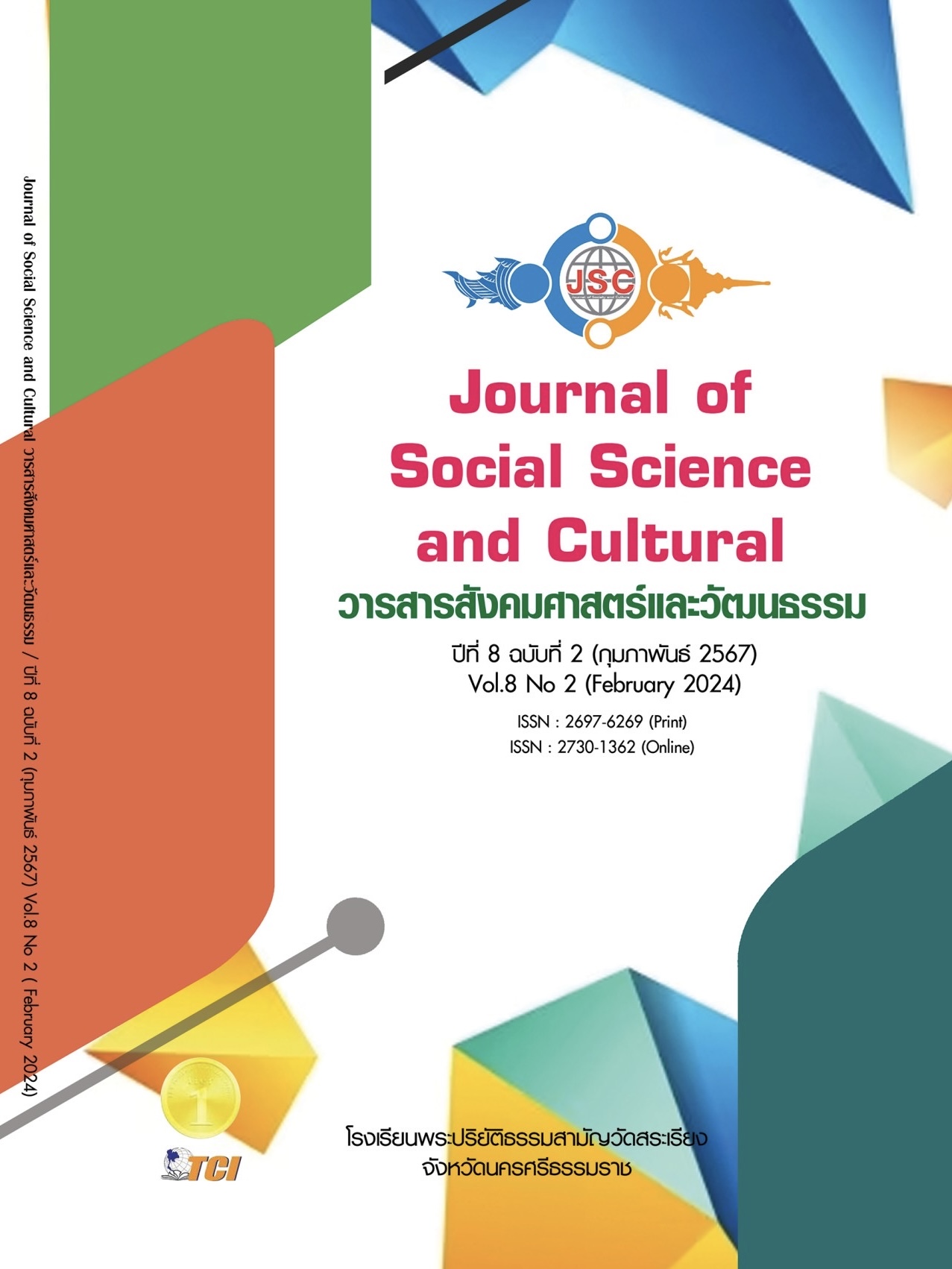DEVELOPING CHARACTERISTIC PROACTIVE YOUNG ENTREPRENEURSHIP ELEMENTS AND BEHAVIORAL INDICATORS AMONG HIGH SCHOOL LEARNERS
Main Article Content
Abstract
The objectives of this research are as follows: 1) to develop proactive young entrepreneurship characteristics (PYEC); 2) to develop behavioral indicators among high school students. Data was gathered from business operator-related concepts, theories, document analysis, and research. Entrepreneurship was synthesized with proactive behavior by searching the databases Google Scholar, SCOPUS, and ThaiLIS, as well as online graduate theses and domestic and international youth entrepreneurship development courses from 1990 to 2023. 28 issues were repertoried. In addition, in-depth interviews were conducted until the data was saturated, validated by 12 experts. Characteristics and elements were synthesized and index of item objective congruence (IOC) analyzed. Results were an index value between 0.60 - 1.00 or very good consistency level, including suggestions and opinions. These findings imply that high school learner PYEC requires understanding successful entrepreneurial characteristics and attitudes, personal abilities and interests, seeking contextual opportunities, self-confidence, creativity, and designing a work plan with guidelines to prevent future risks. Effective communication design consists of three elements: 1) three behavioral indicators designing value through identity; 2) three behavioral indicators creating new ideas ; and 3) two behavioral indicators conveying powerful communication.
Article Details
References
นิภาพรรณ เจนสันติกุล. (2564). แรงงานแพลตฟอร์มในระบบเศรษฐกิจดิจิทัล. วารสารวิชาการแสงอีสาน มหาวิทยาลัยมหามกุฎราชวิทยาลัย วิทยาเขตอีสาน, 18(1), 1-10.
บุณฑริกา บูลภักดิ์. (2560). ธุรกิจศึกษาจากอดีตสู่ยุคศตวรรษที่ 21. วารสารครุศาสตร์, 45(4), 310-325.
ผู้เชี่ยวชาญคนที่ 1. (15 กรกฎาคม 2566). การสัมภาษณ์เพื่อสังเคราะห์องค์ประกอบ ความเป็นผู้ประกอบการรุ่นเยาว์เชิงรุกในระดับมัธยมศึกษาตอนปลาย. (วีรพล แก้วพันธ์อ่ำ และคณะ, ผู้สัมภาษณ์)
ผู้เชี่ยวชาญคนที่ 2. (21 กรกฎาคม 2566). การสัมภาษณ์เพื่อสังเคราะห์องค์ประกอบ ความเป็นผู้ประกอบการรุ่นเยาว์เชิงรุกในระดับมัธยมศึกษาตอนปลาย. (วีรพล แก้วพันธ์อ่ำ และคณะ, ผู้สัมภาษณ์)
ผู้เชี่ยวชาญคนที่ 3. (23 กรกฎาคม 2566). การสัมภาษณ์เพื่อสังเคราะห์องค์ประกอบ ความเป็นผู้ประกอบการรุ่นเยาว์เชิงรุกในระดับมัธยมศึกษาตอนปลาย. (วีรพล แก้วพันธ์อ่ำ และคณะ, ผู้สัมภาษณ์)
ผู้เชี่ยวชาญคนที่ 4. (30 กรกฎาคม 2566). การสัมภาษณ์เพื่อสังเคราะห์องค์ประกอบ ความเป็นผู้ประกอบการรุ่นเยาว์เชิงรุกในระดับมัธยมศึกษาตอนปลาย. (วีรพล แก้วพันธ์อ่ำ และคณะ, ผู้สัมภาษณ์)
ผู้เชี่ยวชาญคนที่ 5. (30 กรกฎาคม 2566). การสัมภาษณ์เพื่อสังเคราะห์องค์ประกอบ ความเป็นผู้ประกอบการรุ่นเยาว์เชิงรุกในระดับมัธยมศึกษาตอนปลาย. (วีรพล แก้วพันธ์อ่ำ และคณะ, ผู้สัมภาษณ์)
ภัทรวรรธน์ จีรพัฒน์ธนธร และสรศักดิ์ เชี่ยวชาญ. (2558). การศึษาการเป็นผู้ประกอบการเพื่อสังคมผู้ประกอบการ. วารสารศึกษาศาสตร์ปริทัศน์ (Kasetsart Educational Review), 33(2), 63-69.
สุชาติ ไตรภพสกุล และชาคริต พิชญางกรู. (2561). ปัจจัยเชิงสาเหตุต่อการเป็นผู้ประกอบการรุ่นเยาว์ของประเทศไทย. วารสารบริหารธุรกิจนิด้า, 22(1), 44-60.
Bateman, T. S. & Crant, J. M. . (1993). The proactive component of organizational behavior: A measure and correlates. Journal of organizational behavior, 14(2), 103-118.
Becherer, R. C. & Maurer, J. G. (1999). The proactive personality disposition and entrepreneurial behavior among small company presidents. Journal of Small Business Management, 37(1), 28-36.
Chigunta, F. (2002). Youth entrepreneurship: Meeting the key policy challenges. Waltham, MA: Education Development Center (EDC).
Covey, S. R. & Victory, I. P. (2004). Habit 1: be proactive. New York: Franklin Covey.
Crant, J. M. (1996). The proactive personality scale as a predictor of entrepreneurial intentions. Management, 29(3), 62-74.
Paul, J. & Shrivatava, A. (2016). Do young managers in a developing country have stronger entrepreneurial intentions? Theory and debate. International Business Review, 25(6), 1197-1210.
UNCTAD, U. (2012). Entrepreneurship policy framework and implementation guidance. Geneva: United Nations.
Wilson-Clark, G. & Saha, S. (2019). Transitions from School to Work. UNICEF: In UNICEF Technical Note.
Zhou, M. & Xu, H. (2012). A review of entrepreneurship education for college students in China. Administrative Sciences, 2(1), 82-98.


